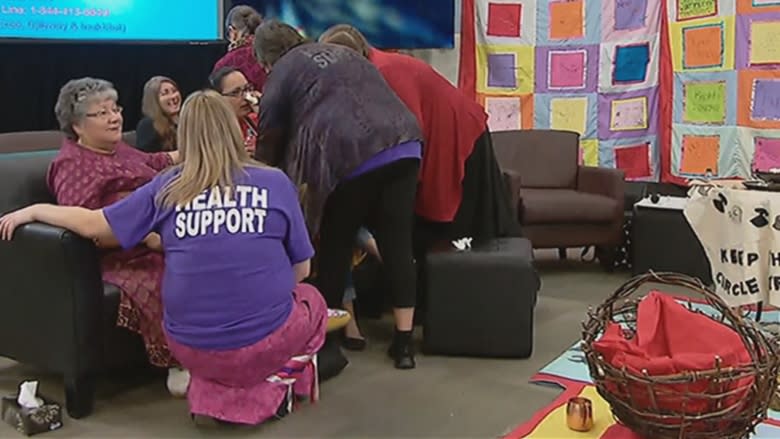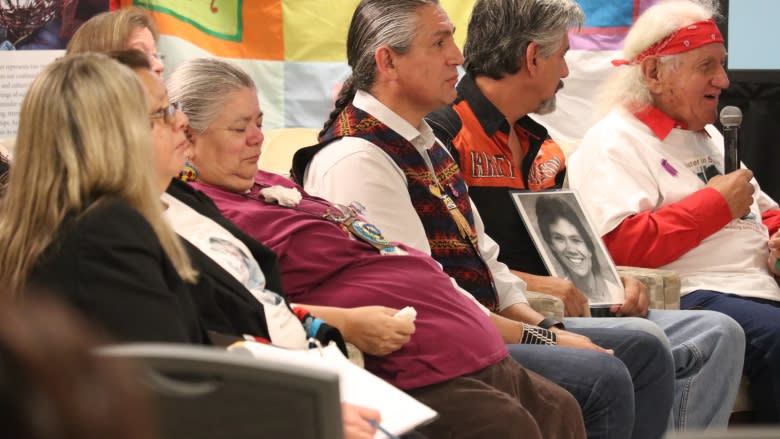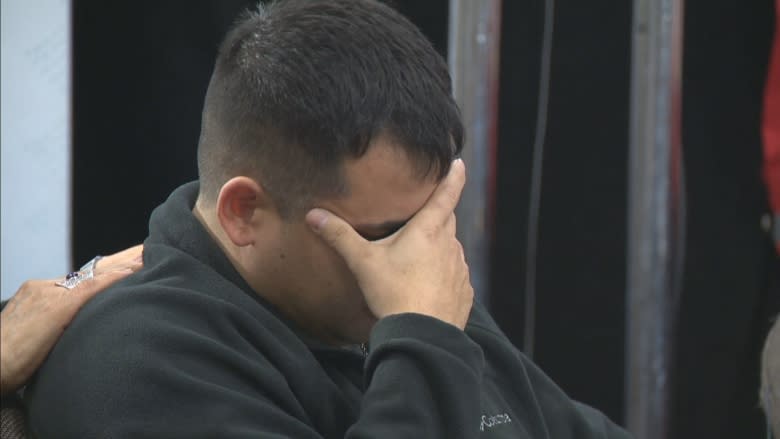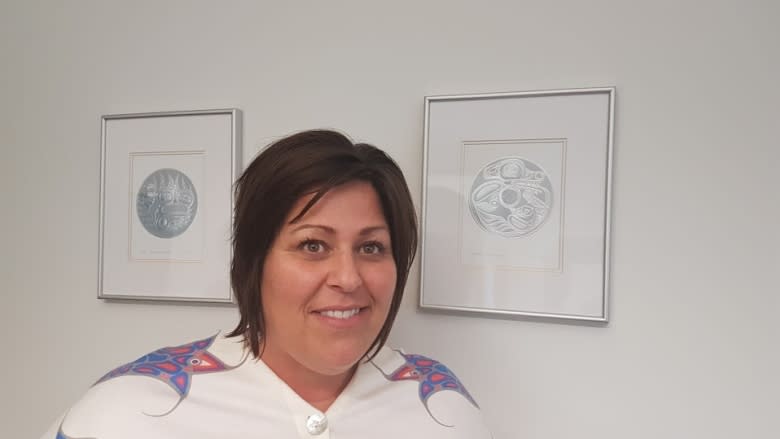Families testifying at MMIWG inquiry say aftercare support is lacking
The National Inquiry into Missing and Murdered Indigenous Women and Girls has come under fire from many directions, but some of the harshest criticism is coming from family members who have spoken at the hearings to date.
They say aftercare — follow-up emotional and mental health support for the people testifying about losing their loved ones — is inadequate.
CBC News spoke to families across the country who have attended hearings about their aftercare and this is what they had to say.
Whitehorse
Lorelei Williams travelled to Whitehorse from Vancouver six months ago to be by her friend's side while she shared her story of surviving violence at the hands of a former partner.
She said her friend didn't know she could give testimony when the hearings came through town, so Williams helped her get connected with the inquiry staff at the last minute so she could have her story included.
It was a fast and emotional process, Williams recalls.
"She was having a really hard time with it. It was so hard because she reopened her wounds," said Williams.
One thing that added to that hard time was figuring out what kind of aftercare would be available after the inquiry team left town. Williams said at one point, a woman who they assumed worked for the inquiry approached them and told them her friend would be eligible to receive 12 free counselling sessions.
After that conversation she said they tried to track the woman down but nobody seemed to know who or what they were talking about.
"So we don't even know if she was involved with the inquiry or not. Like we had no idea. That upset [my friend] more because she really wanted those sessions," she said.
Williams said when she flew back to Vancouver she continued to check in with her friend to see how she was doing and would ask if she had heard from anyone at the inquiry to see how she was doing.
Six months later, Williams says her friend hasn't heard from inquiry staff and has received zero aftercare.
"Just today I asked her again and she said 'Nothing, there's nothing,'" said Williams.
"It was as hard process for her, being a survivor, retelling her story ... she thought this would be a part of her healing journey."
Winnipeg
It's been one month since Barb Houle shared her daughter's story to commissioner Michèle Audette at the Winnipeg hearing.
Cherisse Houle was 17 when she went missing and was found murdered in 2009.
The mother sat through all five days of the public hearings to show her support for other Manitoba families.
"It was very heartbreaking all the time but I tried to sit there because I know what they're going through, so if they need my support, I'm there."
Houle said one day the testimony was more than she could handle and she ran out of the room in tears.
"I felt so overwhelmed because I was by myself and just thinking about my daughter," she said.
"Not one person came out and asked me what was wrong. There was a bunch of [health support workers] sitting there. I thought that's what they were supposed to be doing."
Houle said health support workers did not prepare her for testifying or approach her after to debrief. She said no one from the inquiry has contacted her since to check in or offer her aftercare support.
"I feel that there is no compassion there whatsoever," she said.
Houle said she is done with the inquiry and is thankful she already had support in place with two elders and the other families who understand what she is going through.
Membertou, N.S.
After two weeks, Aggie Gould's emotions are just settling down. Though, she said she may never find peace when it comes to her missing sister.
Gould and some of her family testified on behalf of her sister, Virginia Pictou Noyes, during the hearings in Membertou First Nation in Nova Scotia.
Pictou Noyes disappeared from a medical centre in Bangor, Maine, in 1993, after being severely beaten. Her family has been searching for 24 years.
Gould said that she's been adjusting well since the hearings, but more support from the Inquiry would go a long way.
"I'm just calming down now," she said.
"I'm very fortunate to be involved with a group that understands when I say 'I need to go out for a cup of coffee,' it's just to unwind. So I can get my mind on something else."
Gould said almost all of her emotional and spiritual support has come from people in her region.
Hundreds of volunteers came forward with the Nova Scotia Native Women's Association and Mi'kmaq Women Leaders network to provide food, quiet spaces and spiritual outlets. Gould said many of them call regularly to check up on her family.
Gould said the inquiry's regional liaison reached out multiple times during the hearings, and even followed up a week ago, but other than the commissioners themselves, only one other staff member asked how she was doing.
But, Gould said she doesn't blame the staff — they're dealing with a lot.
"Someone's got the paperwork. Someone's got accommodations. Can you imagine dividing all that with such a small staff?"
Their health is important, too, said Gould, especially when listening to traumatic stories all day, for weeks.
"Can you imagine some of the nightmares they must be having themselves? How hard is that on a person? How are you expected to help someone else?"
Gould said she's outspoken about her sister's story anyway, and that's helped. The nature of this Inquiry, she said, is that the witnesses are already used to the pain.
Edmonton
Paul Tuccaro spent weeks working up the courage and strength to talk about his sister Amber Tuccaro, who was murdered seven years ago near Leduc, Alta., in front of the inquiry in Edmonton and answer questions about the investigation, which remains unsolved.
He said he has remained the "strong one" all these years, not fully accepting the loss of his baby sister, until the inquiry when he finally broke down in tears for all to witness.
Before he knew it, Tuccaro was on his journey home to Fort Chipweyan in northern Alberta. Not sure what to do with the remainder of emotions and stress brought on by testifying a week and a half ago, Tuccaro said he feels lost in limbo.
"I'm tired and emotionally drained," said Tuccaro.
"But I can't believe no follow up [from the inquiry team] now that I'm back in Fort Chipewyan. Nothing. I guess aftercare only looks good in the handout."
He said there was support on site, and he was given information about how to apply for counselling services from home but he said he was unprepared to determine what his own aftercare needs were.
"I was given a handout which had numbers for resources but that's good for some and not for others," he said.
"I'd much rather have had a debriefing meeting with the inquiry before I left Edmonton."
He said prayer has been his main tool for getting through it all.
'Aftercare is not prescriptive'
In an email to CBC News, director of the inquiry's health team Terrellyn Fearn acknowledged the "painful experience" of families and loved ones at the hearings.
"Aftercare is not prescriptive, meaning we do not have a list of services we offer, but rather we engage with the family members and survivors to take their direction on what they feel they may need to support them through the aftercare phase. They have the choice in determining their own needs."
She said the health team accommodated a few requests from individuals seeking support that were brought up to them in Edmonton on a case-by-case basis but it was up to the individuals to reach out to the health team.
The inquiry agreed to fund a family member to continue therapy with a trusted psychologist after their non-insured health benefits had run out, she said, the inquiry also agreed to financially support another individual who requested to attend a week-long intensive healing therapy retreat where participants learn how to walk through grief and receive a toolkit to support them afterward.
She said referrals to local elders for support is another way the inquiry health team is helping with aftercare.




